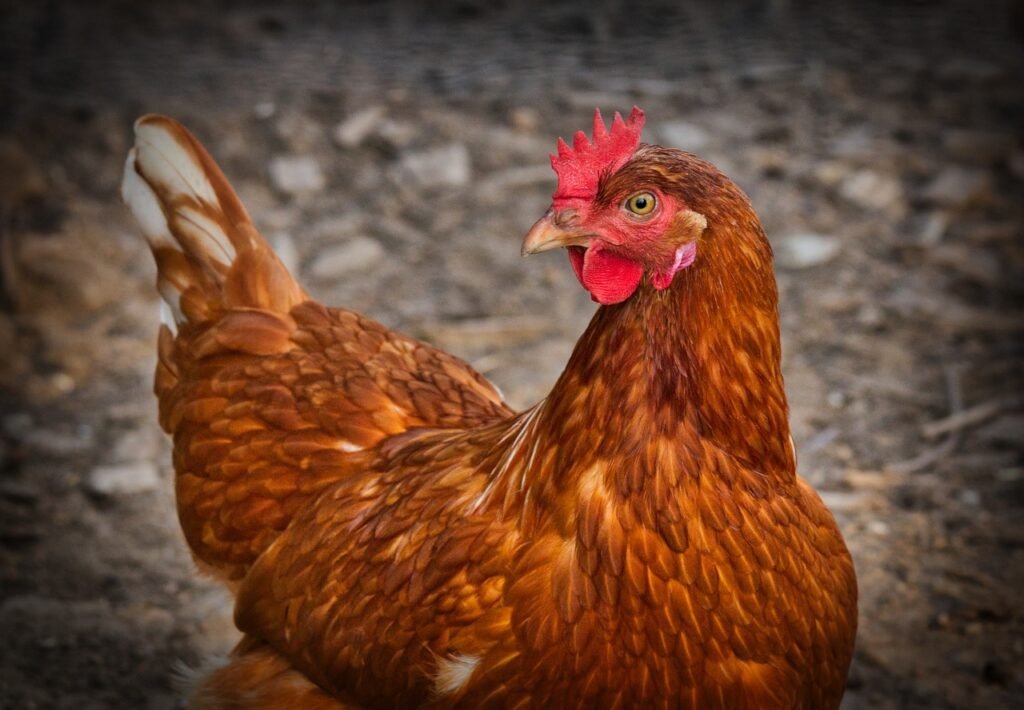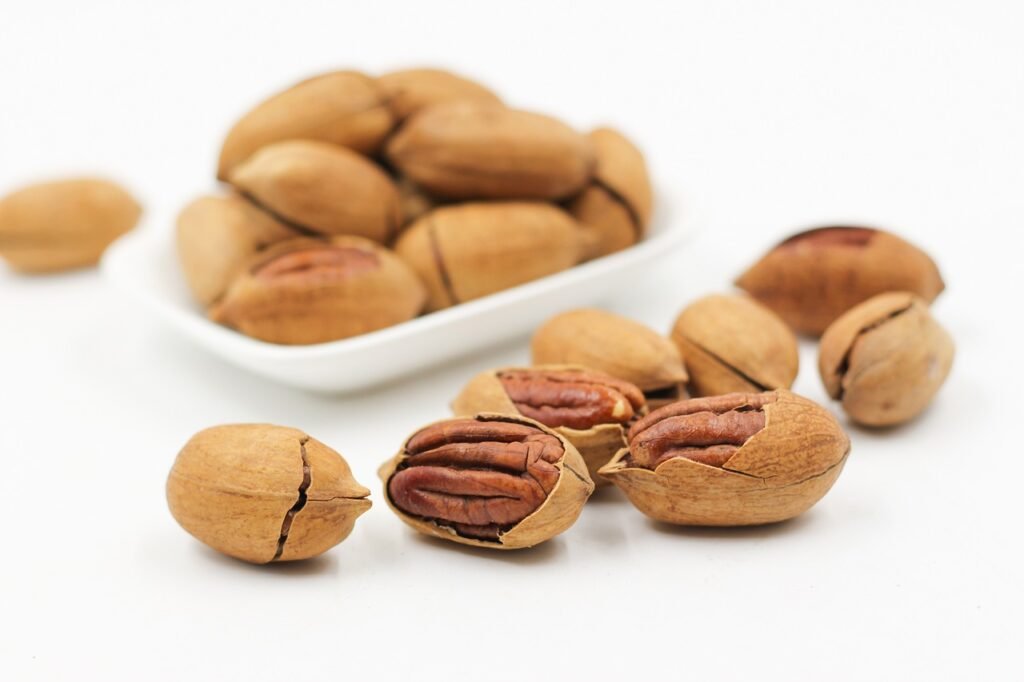Chickens enjoy a variety of foods, and many owners wonder if pecans are safe to share with their flock. The answer is yes, chickens can eat pecans in moderation. These nuts can provide some nutritional benefits, but there are a few things to keep in mind about their health effects.
While pecans contain healthy fats and protein, moderation is key. Chickens have different dietary needs, and too many nuts can upset their stomachs or lead to weight gain. It’s important to offer nuts as an occasional treat rather than a regular part of their diet.
Knowing what foods are safe for chickens is crucial for their health. Owners can feel reassured that, when given carefully, pecans can be a tasty addition to a chicken’s diet.

Nutritional Profile of Pecans
Pecans are a nutritious nut that offers a variety of health benefits. Their unique composition includes healthy fats, certain vitamins, and dietary fiber, making them a popular choice for many diets. Understanding the nutritional profile helps to evaluate their suitability for both humans and chickens.
Fat Content in Pecans
Pecans are known for their high fat content, which plays a key role in their nutritional value. About 72% of the calories in pecans come from fat. Most of these fats are healthy monounsaturated fats.
Key points about fat in pecans:
- Types of fats: They contain oleic acid, which is beneficial for heart health.
- Caloric density: A 1-ounce serving has around 20 grams of fat, making them energy-dense.
Consuming pecans in moderation can provide essential fatty acids. Overall, their fat content contributes positively when part of a balanced diet.
Vitamins and Minerals
Pecans are rich in several important vitamins and minerals. They provide a good source of Vitamin E, an antioxidant that helps protect cells.
Important vitamins and minerals in pecans include:
- Vitamin A: Supports vision and immune function.
- Magnesium: Essential for muscle function and heart health.
- Zinc and Copper: Important for overall metabolic processes.
These nutrients highlight the value of pecans in a healthy diet. Incorporating them can help meet daily nutritional needs.
Fiber in Pecans
Dietary fiber is another beneficial component of pecans. They contain about 3 grams of fiber per ounce. Fiber is important for digestive health and can aid in maintaining a healthy weight.
Benefits of fiber in pecans:
- Promotes satiety: Helps individuals feel full longer.
- Supports digestion: Aids in regular bowel movements.
Including fiber-rich foods like pecans can help improve overall dietary quality. This makes them a good snack option for both humans and chickens, promoting better health.
Health Benefits of Pecans for Chickens
Pecans can offer several important health benefits for chickens. These nuts provide necessary energy and support overall well-being. The nutrients found in pecans also help boost the immune system.
Energy Boost and Metabolism
Pecans are rich in healthy fats and proteins. These nutrients provide a significant energy boost to chickens. A higher energy level can lead to improved activity and productivity.
The fats in pecans help in the proper functioning of the metabolism. This is essential for chickens, especially during the molting season or when they are laying eggs. Increased metabolic activity can also support better weight management.
Feeding chickens a small amount of pecans can contribute to their overall energy needs. This can be especially beneficial for active or free-range chickens.
Antioxidant Properties
Pecans contain antioxidants, which are important for health. Antioxidants help fight free radicals in the body. Free radicals can cause cell damage and lead to various health issues.
The antioxidants in pecans may support a healthy immune system. A strong immune system helps chickens resist diseases. This can lead to healthier chickens and better egg production.
Additionally, these nuts provide vitamins and minerals, enhancing health. Some key antioxidants found in pecans are vitamin E and flavonoids. These compounds play a role in maintaining optimal health in chickens.
Risks of Feeding Pecans to Chickens
Feeding chickens pecans can pose several risks. It’s important for chicken owners to understand these issues to ensure their flock’s health.
Choking Hazards and Size of Pecans
Pecans are relatively large nuts compared to the size of a chicken’s throat. When given whole, they can present a choking hazard. Chickens may struggle to swallow them and could become distressed if they cannot breathe properly.
To minimize this risk, owners should chop or crush pecans into smaller pieces before feeding. This makes them easier for chickens to handle and reduces the chance of choking. Keeping an eye on chickens while they eat can also help catch any problems early on.
Possible Toxins and Molds
Pecans can sometimes harbor dangerous substances, especially if they are old or improperly stored. Aflatoxins are a type of toxin produced by mold that can grow on nuts. These toxins are harmful to chickens and can cause serious health issues.
When feeding pecans, ensure they are fresh and free from mold. If there is any doubt about their safety, it is best to avoid feeding them to chickens altogether. Always inspecting the nuts before offering them can help prevent potential poisoning.
Allergic Reactions and Sensitivity
Some chickens may experience allergic reactions to pecans. Though rare, these reactions can lead to symptoms like digestive upset or skin irritations. Not all chickens have the same dietary needs, and some may be more sensitive to certain foods.
Introducing pecans gradually and monitoring for any adverse reactions is wise. If any signs of allergy appear, it’s best to stop feeding pecans immediately. Consult a veterinarian if symptoms persist to ensure the chicken’s health and well-being.
Proper Feeding Practices
Feeding chickens pecans requires care to ensure their health and well-being. Proper methods include how to prepare the nuts, how often to feed them, and how to mix them with other foods. This guidance will help keep chickens happy and healthy.
Preparation of Pecans for Chickens
Before giving pecans to chickens, they should be prepared properly. Whole pecans can be difficult for chickens to eat, so it’s best to chop them into smaller pieces. This makes it easier for the birds to consume and digest the nuts.
Pecans should always be fresh and free from mold. Moldy nuts can cause health problems for chickens. It is also important to ensure that there are no added seasonings or salt, as these can be harmful.
Frequency and Quantity of Pecans
Chickens should not eat pecans in large amounts. A small handful of chopped pecans can be given as a treat a few times a week. This helps to maintain a balanced diet.
Too many pecans can lead to obesity in chickens due to their high-fat content. It is vital to monitor the chickens’ overall food intake to ensure they are receiving the right nutrients.
Incorporating Pecans with Other Foods
Pecans can be mixed with other safe foods to create a balanced diet. Combining pecans with fruits, vegetables, or grains can enhance the chickens’ meals.
For example, chopped pecans can be added to a mix of oats and leafy greens. This not only provides variety but also helps with their digestion. Always ensure that the main diet remains balanced and nutritious.

Alternatives to Pecans for a Balanced Diet
Chickens benefit from a varied diet that includes different foods. If pecans are not suitable, there are many other options.
Seeds and Nuts:
- Sunflower seeds
- Pumpkin seeds
- Almonds (in moderation)
Fruits:
- Apples (without seeds)
- Berries (like strawberries and blueberries)
- Bananas
Vegetables:
- Carrots
- Spinach
- Broccoli
Grains:
- Oats
- Barley
- Whole wheat
Protein Sources:
- Mealworms
- Cooked eggs
- Fish meal (in small amounts)
Each of these foods provides essential nutrients that support chicken health. They can help ensure chickens receive a balanced diet. Always introduce new foods slowly to avoid digestive issues.
Mixing these alternatives can keep the chickens interested in their food. This approach can enhance their overall well-being.
Expert Opinions on Chickens and Tree Nuts
Experts generally agree that tree nuts should be given to chickens with caution. While chickens can eat small amounts of various tree nuts, moderation is key.
Here are some important points:
- Nutritional Value: Nuts are high in fat and protein. While this is beneficial, too much can lead to obesity.
- Digestibility: Chickens may struggle to digest tree nuts. This can cause digestive issues if they eat too many.
- Safe Varieties: Some nuts, like peanuts and almonds, are typically considered safer than others. Pecan nuts should be given sparingly.
Many poultry specialists advise against making nuts a regular part of a chicken’s diet. Instead, nuts can be an occasional treat.
Important Notes:
- Preparation: Nuts should be unsalted and unseasoned. Salted or flavored nuts can be harmful.
- Choking Hazard: Whole nuts can pose a choking risk. It is best to chop or crush them before offering.
When feeding chickens tree nuts, it’s wise to observe their reactions. If any signs of discomfort or digestive issues occur, it is best to stop feeding them nuts.
Conclusion
Chickens can eat pecans, but they should only have them in moderation. These nuts are high in fat and can lead to health issues if too many are consumed.
When feeding pecans to chickens, consider the following:
- Limit Quantity: Small amounts are best.
- Chop Them Up: This makes it easier for the chickens to eat.
- Watch for Signs: Monitor the chickens for any digestive problems.
Pecans also provide some nutritional benefits. They can offer protein and healthy fats, but these should not replace regular feed.
Always ensure the chickens have access to fresh water, especially when trying new foods. This helps keep them hydrated and healthy.
In conclusion, while pecans can be part of a varied diet, they should not be a main food source for chickens. Managing their diet is important for their health and well-being.
Frequently Asked Questions
There are many questions about what nuts chickens can eat safely. This section covers safe options, potential risks, and specific nuts like pecans and almonds.
What types of nuts are safe for chickens to consume?
Chickens can eat some nuts in moderation. Safe options include peanuts, walnuts, and unsalted cashews. These nuts are not toxic and can provide protein and healthy fats.
Are pecan shells harmful to chickens if ingested?
Pecan shells are not toxic to chickens, but they are hard to digest. If chickens eat too many shells, it could lead to digestive issues. It’s best to feed them the nutmeat instead.
Can chickens have almonds as part of their diet?
Chickens can eat almonds in small amounts. Raw almonds are better than salted or flavored varieties. The small size makes them easy for chickens to consume.
Are there any nuts that chickens should avoid?
Chickens should avoid macadamia nuts. These nuts are toxic to many animals, including birds. It’s important to stick with safe nuts to keep chickens healthy.
What are the potential risks of feeding chickens raisins?
Raisins can be risky for chickens if eaten in large amounts. They may cause digestive upset or kidney issues in some birds. Moderation is key when offering raisins as a treat.
Can birds, such as chickens, eat chopped pecans safely?
Chickens can safely eat chopped pecans. Chopping them makes it easier for chickens to eat and digest. As with all treats, pecans should only be given in moderation.





